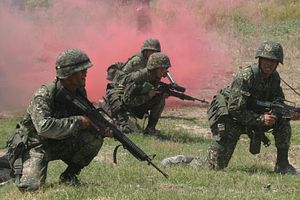In the southern Philippines, government security troops, led by the Armed Forces of the Philippines, in search of the most-wanted militant Isnilon Hapilon clashed with extremists affiliated with the Islamic State-linked Maute Group and the Abu Sayyaf Group. A week later, Defense Secretary Delfin Lorenzana disclosed that around 500 Islamist terrorists had fought in Marawi City. Over a hundred deaths have been tallied and thousands of internally displaced people fled ground zero during the siege.
The recent violence begs the question: a decade after the enactment of the Philippines’ anti-terror law, what has been done to fight protracted terrorism in the country?
The Human Security Act (HSA) of 2007, otherwise known as Republic Act No. 9372, was enacted by the 13th Congress of the Philippines. The law took effect on July 15, 2008, providing a legal framework for the government’s anti-terrorism strategy and security policies. However, there has yet to be a landmark case under the special statute.
The 35-page anti-terror law received wide criticism due to apparent loopholes that need to be amended. First, there is absence of any definition for terrorism, which makes the law vague, ambiguous, and highly susceptible to abuse. The act is also intentionally broad, as seen in its reference to human security. However, the Declaration of Policy of the HSA of 2007 explicitly expressed that “the State shall uphold basic human rights and fundamental liberties of the people as enshrined in the Constitution.” The act also reiterated that “powers of the executive department of the government shall not prejudice respect for human rights, which shall be absolute and protected at all times.”
This tension between a broad scope and protection to human rights plays out in the act’s provisions. For example, the special law provides that persons who have been charged with terrorism and conspiracy to commit terrorism can be detained under house arrest, restricted from traveling; and/or, prohibited from using any cellular phones, computers or other means of communicating with people outside their residence. Such restrictions can be applied even if the accused have been granted bail because evidence of their guilt is not absolute. However, the anti-terror act also provides that any person accused of terrorism who is later acquitted by the court shall be entitled to a payment of half a million pesos in damages for every day that the individual has been detained or deprived of liberty or arrested without a warrant as a result of such an accusation.
Then there is the issue of the 87-year-old Revised Penal Code or Republic Act No. 3815, which lists punishments for 11 crimes potentially linked to terrorism, including piracy; rebellion or insurrection; coup d’etat; murder; kidnapping and serious illegal detention; arson; hijacking; highway robbery; illegal possession of firearms. Other terrorist acts could potentially be seen as violations of the Toxic Substances and Hazardous and Nuclear Waste Control Act of 1990, and the Atomic Energy Regulatory and Liability Act of 1968.
The HSA of 2007 made terrorism “a crime against the Filipino people, against humanity, and against the law of nation.” Legally speaking, terrorism can be committed when a crime contains three essential elements of terrorism: (1) the commission of one or more of the crimes enumerated above, (2) the crime sows and creates a condition of widespread and extraordinary fear and panic among the populace, and (3) the purpose of the crime is to coerce the government to give in to an unlawful demand.
The bone of contention in the Marawi siege today, just like the Zamboanga standoff in 2013, is how to differentiate rebellion from terrorism. The Philippine court defines rebellion as something that cannot be combined with murder, arson, robbery, and/or other common crimes. Political crimes are directly aimed against the political order, but common crimes may also be committed to achieve a political purpose.
As the current terrorist conundrum in Mindanao shows, there is lack of clear parameters for defining common crimes as acts of terrorism. Rebellion or insurrection is a crime against public order and is committed by rising publicly and taking arms against the government — this would necessarily sow and create a condition of widespread and extraordinary fear and panic among the populace. That means the anti-terror law, in effect, should supplant rebellion and insurrection in Philippine criminal laws. Rather than separate crimes, such acts should be considered the crime of terrorism.
Branding militant groups as terrorist groups becomes contentious when combined with the peace processes initiated by the Philippine government. There was a time in 2001 when the Philippine government pleaded with the U.S. government not to put the Moro Islamic Liberation Front on the Foreign Terrorist Organization list because of the latter’s active participation in the peace process. All the while, the secessionist group sowed terrorism and challenged the Philippine Constitution, using guerrilla warfare and terrorist activities to achieve its ends.
The Philippines is a country where insurgency and terrorism overlap, as global terrorists often exploit local grievances and resentments to spread an ideology of enmity and violence. The key of solving terrorism lies not in crafting and enacting special laws on anti-terrorism but rather in addressing the bigger socioeconomic problems in Mindanao. The Philippine government should deliver basic services to the marginalized sectors and respect pluralism in the region.
Chester Cabalza, Ph.D., is an Associate Professor at the National Defense College of the Philippines and a Senior Lecturer at the University of the Philippines Diliman. The views of the author are his and do not represent his organizational affiliations.

































